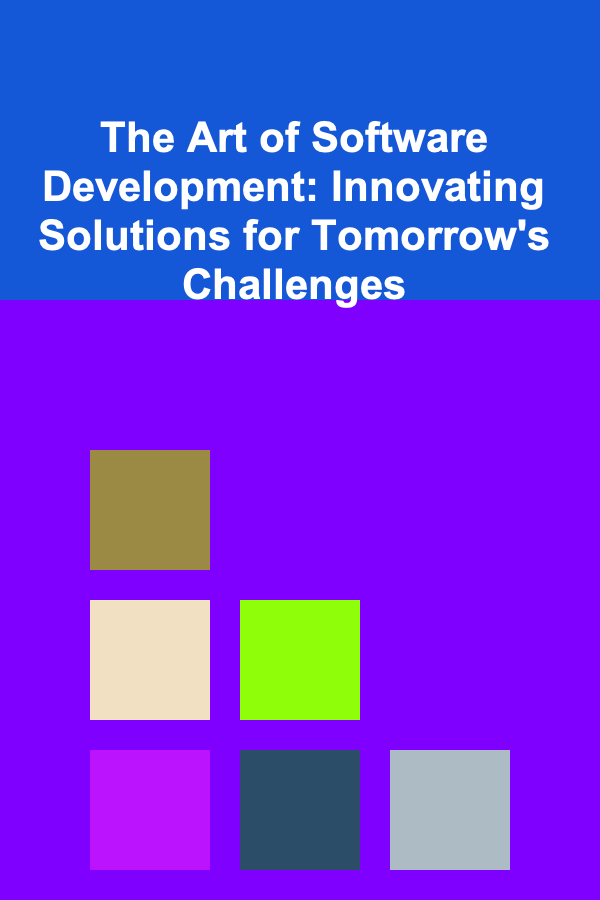
The Art of Software Development: Innovating Solutions for Tomorrow's Challenges
ebook include PDF & Audio bundle (Micro Guide)
$12.99$6.99
Limited Time Offer! Order within the next:

Software development is a continuously evolving field, marked by ever-changing technologies, methodologies, and challenges. It is a craft that requires both technical prowess and creative thinking. While coding is undeniably essential, the true art of software development lies in our ability to create innovative, scalable, and sustainable solutions for tomorrow's challenges.
In this guide, we will explore how software developers can innovate, adapt, and think critically to address the complex problems of the future. From mastering technical skills to embracing new frameworks, from fostering collaboration to making ethical decisions, this article delves into the multifaceted nature of software development and how developers can position themselves as agents of innovation.
Adapting to Change: The Lifeblood of Software Development
Software development thrives in an environment of constant change. New languages, tools, and paradigms emerge regularly, challenging developers to learn and adapt quickly. However, while these changes bring new opportunities, they also come with their own set of challenges.
Embrace Lifelong Learning
The most successful software developers are those who view learning as an ongoing process. The tech industry moves at a breakneck pace, and it's essential to stay current with trends, frameworks, and tools.
- Stay Curious: Constantly explore new programming languages and paradigms. For instance, if you are comfortable with object-oriented programming, try learning functional programming, or explore newer languages like Rust that bring innovative memory management features.
- Leverage Online Learning Platforms: Platforms like Coursera, Udemy, and edX offer a wide array of courses that can help you master new skills. However, don't limit your learning to technical topics. Understanding software architecture, project management, and even user experience design can also be extremely valuable.
- Participate in Developer Communities: Engaging with fellow developers on platforms such as StackOverflow, GitHub, and Reddit can help you stay informed about the latest trends. These communities provide opportunities to discuss emerging technologies, share resources, and collaborate on projects.
Build a Growth Mindset
In the fast-evolving world of software development, you'll face setbacks, bugs, and failures. These are not roadblocks but rather opportunities to grow. Cultivating a growth mindset allows you to turn obstacles into learning experiences.
- View Challenges as Opportunities: Embrace failures as part of the learning process. Each bug or roadblock teaches you something new that enhances your problem-solving ability.
- Iterate and Improve: Much like software development itself, your approach to learning and growing should be iterative. Continuously refine your techniques, tools, and processes based on feedback and new knowledge.
Crafting Innovative Solutions: The Core of Software Development
Innovation is the cornerstone of software development. It's not just about writing code; it's about writing code that can solve real-world problems, streamline processes, and create value for users.
Identify Real-World Problems
To create innovative solutions, developers must first identify real-world problems that need solving. This requires deep empathy and the ability to see the world through the eyes of users.
- Understand User Needs: Whether you are developing a consumer-facing app or a business solution, user-centered design is essential. Conduct user research, gather feedback, and ensure that your solution addresses their pain points in a meaningful way.
- Solve the Right Problems: It's easy to get caught up in building something because it's technically impressive, but it's more important to focus on solving problems that matter. Identify problems that are both feasible to solve and have the potential to create significant impact.
Use Cutting-Edge Technologies
Innovative solutions often require the use of new or emerging technologies. As software developers, we need to understand how to leverage these technologies effectively and make informed decisions about their implementation.
- Cloud Computing: Cloud platforms like AWS, Azure, and Google Cloud provide the scalability and flexibility required for modern applications. Developing cloud-native applications can improve efficiency and reduce infrastructure costs.
- Artificial Intelligence (AI) and Machine Learning (ML): These technologies are transforming various industries. From predictive analytics to intelligent automation, AI and ML open up new possibilities for software developers to create smart, adaptable systems.
- Blockchain: Blockchain is not just for cryptocurrencies; its potential for creating decentralized, secure applications is vast. Understanding blockchain's core principles can help you innovate in fields such as finance, supply chain, and data management.
- Internet of Things (IoT): IoT devices are becoming more common in everyday life, from smart homes to connected cities. Developers who understand how to build and integrate IoT systems will be in high demand.
However, with the power of these tools comes the responsibility to use them judiciously. It's crucial to weigh the benefits and trade-offs of each technology and ensure it aligns with the problem you are solving.
Design for Scalability and Performance
Innovative solutions must not only solve the problem at hand but also be designed to scale efficiently as the demand grows. A solution that works for a small user base may fail when the number of users increases.
- Scalability: Build your system with scalability in mind. Utilize design patterns like microservices to ensure that your solution can grow with increasing loads. Use caching strategies, database indexing, and load balancing to optimize performance.
- Performance Optimization: Write efficient code that minimizes bottlenecks. Profiling tools can help identify performance issues such as memory leaks or excessive database queries. Always keep the user experience in mind---slow software can frustrate users and lead to churn.
Collaboration: The Key to Successful Software Development
In the art of software development, collaboration plays a crucial role. While individual coding skills are important, the ability to work effectively with others is what leads to truly innovative solutions.
Foster a Collaborative Team Environment
Most software projects involve teams of developers, designers, product managers, and other stakeholders. Developing software in a silo can lead to inefficiencies and missed opportunities for innovation.
- Agile Methodology: Embrace Agile practices like Scrum and Kanban to improve collaboration and productivity. Agile methodologies allow teams to iterate rapidly, adapt to changing requirements, and deliver working software regularly.
- Continuous Integration and Deployment (CI/CD): Implement CI/CD pipelines to automate the testing and deployment of your code. This ensures that new features can be released quickly, and bugs are caught early, enabling a faster feedback loop.
- Cross-Disciplinary Communication: Developers should work closely with other departments, including design, product, and marketing, to ensure that software solutions align with business goals. Regular communication ensures that the final product delivers value to users.
Code Reviews and Pair Programming
Engage in code reviews and pair programming to ensure that your solutions are both technically sound and of high quality.
- Code Reviews: Regular code reviews help identify issues before they become problems. They also offer opportunities for junior developers to learn from their more experienced peers, leading to overall team growth.
- Pair Programming: Pair programming involves two developers working together on the same codebase. This technique promotes collaboration, improves code quality, and fosters knowledge sharing.
Ethical Software Development: Navigating Tomorrow's Challenges
As software becomes increasingly integrated into every aspect of society, the ethical implications of software development are more important than ever. Developers have a responsibility to consider the impact their work will have on society and the environment.
Prioritize Privacy and Security
With the rise of data-driven applications, ensuring the privacy and security of user data has never been more important. Developers must adhere to best practices in security and compliance to protect users and avoid costly data breaches.
- Data Encryption: Implement encryption protocols to ensure that sensitive data is transmitted and stored securely.
- Secure Development Lifecycle: Adopt a secure software development lifecycle (SDLC) that includes threat modeling, code scanning, and regular security audits.
- Compliance: Stay informed about privacy laws such as GDPR, CCPA, and HIPAA, and ensure that your software adheres to legal and ethical standards.
Build Inclusive and Accessible Solutions
Software should be inclusive and accessible to everyone, regardless of their abilities. Ethical software development involves designing systems that are usable by people with diverse needs.
- Accessibility Standards: Follow accessibility guidelines such as the WCAG (Web Content Accessibility Guidelines) to ensure that your applications are usable by people with disabilities.
- Inclusive Design: Consider the needs of diverse user groups when developing software. This includes providing multilingual support, ensuring gender-neutral language, and accommodating users with different levels of technical proficiency.
Environmental Considerations
Software development also has an environmental impact. From the energy consumption of data centers to the carbon footprint of distributed systems, developers must be mindful of the environmental consequences of their work.
- Optimize Resource Usage: Design software that minimizes unnecessary computations and reduces energy consumption, especially in cloud environments.
- Sustainable Development Practices: Consider the environmental impact of the tools and platforms you use, opting for sustainable solutions where possible.
Looking Ahead: The Future of Software Development
The future of software development holds endless possibilities, but it also comes with its own set of challenges. As technology continues to advance, developers must stay ahead of the curve by embracing emerging trends and anticipating future needs.
Quantum Computing
Quantum computing promises to revolutionize how we solve complex problems. While quantum computers are still in their infancy, developers who understand the principles of quantum mechanics and quantum algorithms will be well-positioned for the future.
Augmented and Virtual Reality (AR/VR)
AR and VR technologies are changing how we interact with digital content. From immersive gaming experiences to virtual training environments, software developers have an opportunity to shape the next generation of interactive applications.
Autonomous Systems and AI Ethics
As autonomous systems and AI become more integrated into our lives, the ethical implications of these technologies will grow more pronounced. Developers must play an active role in ensuring that AI is used ethically and responsibly, avoiding bias and promoting fairness.
Conclusion
The art of software development goes far beyond writing code. It's about creating innovative solutions that tackle real-world challenges, working collaboratively with others, and considering the ethical implications of our work. As software developers, we are the architects of tomorrow's digital world. By embracing change, mastering emerging technologies, fostering collaboration, and making ethical decisions, we can ensure that our solutions are not just effective but also sustainable and responsible.
The future of software development is bright, and as innovators, we have the opportunity to shape that future in profound ways. Let's embrace the challenges and opportunities that lie ahead and continue pushing the boundaries of what is possible.
Reading More From Our Other Websites
- [Rock Climbing Tip 101] How to Choose the Perfect Chalk Bag for High‑Altitude Alpine Ascents
- [Organization Tip 101] How to Use a Miter Saw for Perfect Crown Molding Cuts
- [Home Cleaning 101] How to Deep Clean a Closet and Maximize Space
- [Home Security 101] How to Train Your Family on Home Security Best Practices
- [Home Soundproofing 101] How to Soundproof a Townhouse: Effective Solutions for Multi-Unit Living
- [Trail Running Tip 101] Best High‑Altitude Acclimation Techniques for Alpine Trail Runners
- [Metal Stamping Tip 101] Top 7 Design Tips for Flawless Custom Metal Stamps
- [Home Lighting 101] How to Use Lighting to Highlight Your Home's Best Features
- [Home Soundproofing 101] Best Home Soundproofing for Apartments: Maximizing Quiet with Minimal Investment
- [Home Soundproofing 101] How to Achieve Airborne Noise Reduction for a Quieter Home Environment

How to Deal with Noisy Neighbors in a Rental Property
Read More
How to Maintain Content Consistency While Scaling Your Strategy
Read More
How to Manage Technology Use in Your Wellness Space
Read More
How to Stage Your Home in Preparation for a Move
Read More
How To Get Voluminous Hair with Simple Tricks
Read More
How to Track Your Alcohol and Tobacco Spending by Occasion
Read MoreOther Products

How to Deal with Noisy Neighbors in a Rental Property
Read More
How to Maintain Content Consistency While Scaling Your Strategy
Read More
How to Manage Technology Use in Your Wellness Space
Read More
How to Stage Your Home in Preparation for a Move
Read More
How To Get Voluminous Hair with Simple Tricks
Read More